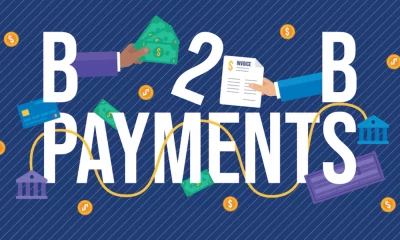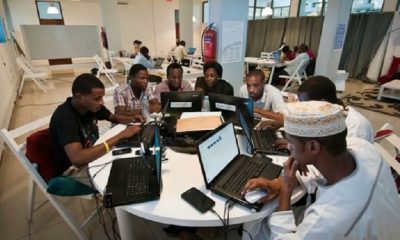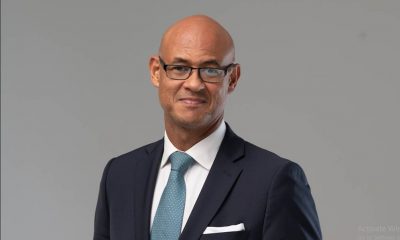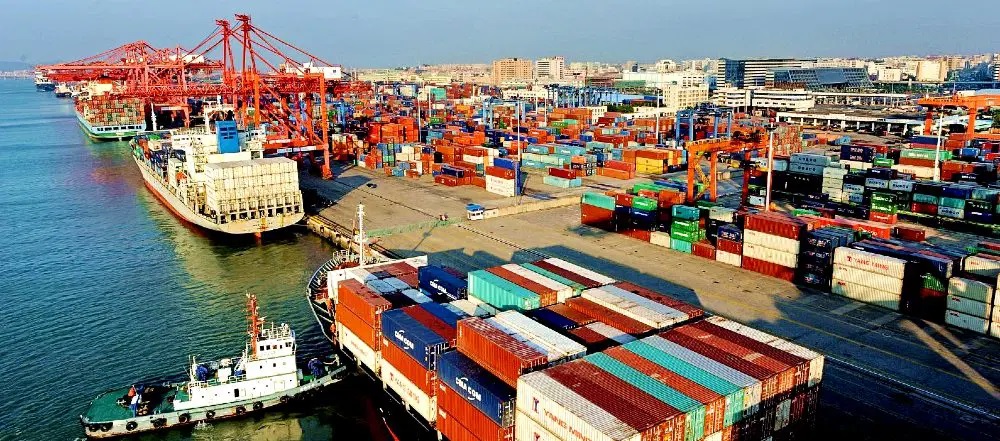World
Fostering Intra-African Trade: Challenges and Perspectives
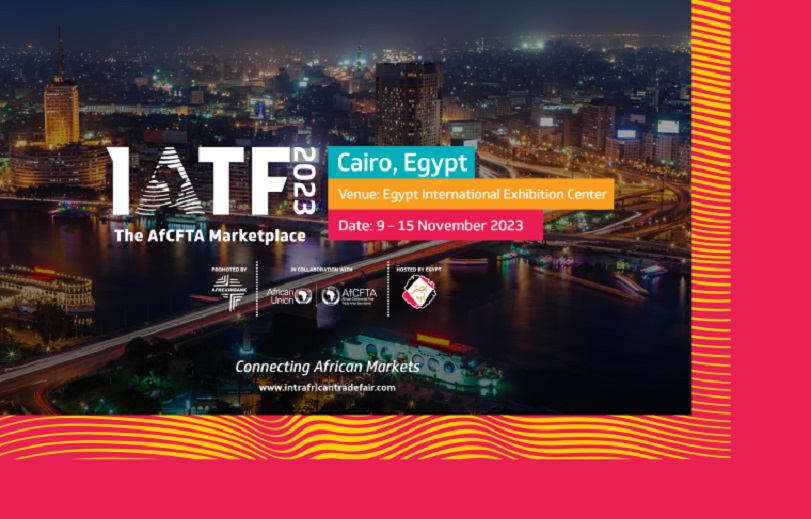
By Professor Maurice Okoli
Over the past few years, African Union, the continental organization, has made intra-African trade its newest flagship and has created the Intra-African Trade Fair (IATF), which provides a unique and valuable platform for potential investors to support the continent’s transformation through industrialisation and export development, for businesses to access adequate trade and market information, and operate in an integrated single African market of over 1.4 billion people with a combined gross domestic product of over $3.5 trillion under the African Continental Free Trade Area (AfCFTA).
Organized by the African Export-Import Bank (Afreximbank), in collaboration with the African Union and the Secretariat of the African Continental Free Trade Area (AfCFTA), it was the historic third edition of the IATF, held in Cairo, Egypt from November 9-15, 2023. Under the theme The AfCFTA Marketplace, it brought together high-powered government officials, ministers, representatives of central banks, regulatory bodies and agencies, legislative authorities, commercial banks, law firms, entrepreneurs, and exporters from across Africa and beyond.
The importance of the Intra-African Trade Fair (IATF2023) was given as follows:-
(i) Promoting intra-African trade: The IATF plays a crucial role in boosting trade among African countries. Intra-African trade is generally lower compared to other regions, and the fair aims to address this by creating a conducive environment for African businesses to trade with each other.
(ii) Market Access: It provides African businesses with access to a larger market within the continent. This enables companies to expand their customer base and increase sales, ultimately contributing to economic growth.
(iii) Facilitating Networking: The fair brings together a diverse range of businesses, government officials, investors, and trade experts. This facilitates networking and partnerships that can lead to collaborations and business growth.
(iv) Showcasing African Products and Services: African businesses have the opportunity to showcase their products and services to a wider audience. This not only helps in building brand recognition but also highlights the quality and diversity of goods and services produced on the continent.
(v) Attracting Investment: The IATF attracts domestic and foreign investors interested in African markets. This can lead to increased foreign direct investment (FDI), which can fuel economic development and job creation.
In addition to establishing business-to-business and business-to-government exchange platforms for business deals and advisory services. The conference ran alongside the exhibition and featured high-profile speakers and panellists addressing topical issues relating to trade, trade finance, payments, trade facilitation, trade-enabling infrastructure, trade standards, industrialization, regional value chains and investment.
It marks one more significant step forward towards achieving economic independence which seemingly eluded the continent since 1963, the year the African organization was established and later transformed into what is popularly referred to as the African Union (AU). As stipulated by the explicit guidelines, the AU oversees and monitors the entire aspects of multifaceted development across Africa.
The AU is a sought-after platform for establishing mutually beneficial contacts and promoting bilateral relations for regional economic blocs, and dynamically developed regions such as Asia-Pacific, the United States and Canada to Latin America and Europe.
With the geopolitical changes and emerging multipolar political and economic order, Africa has become the main focal point in the world. In a practical context, Africa forms one of the current global transformations at the intersection of the past and the future. At the same time, Africa has already recognized its past of the adverse impact of resource exploitation primarily due to former leaders’ weak policies. Now it has the opportunity to make a tectonic shift and get engaged in a more equitable integrated, multipolar world.
With vigour, Africa can continue pursuing an independent continental policy to improve its economic status, and further strengthen its sovereignty with an increasing number of states in the Global South, and most probably in the East. Of course, it requires some unity in diversity in order to achieve this sustainable economic sovereignty.
The AU’s involvement in the IATF 2023 highlights its commitment to promoting economic cooperation and integration among African nations. By actively coordinating the trade fair, the AU aims to showcase Africa’s potential as a hub for intra-African trade and attract investments from both within and outside the continent.
The AU’s involvement in the IATF 2023 also signifies its recognition of the importance of regional economic integration in boosting Africa’s overall trade performance and fostering sustainable development across the continent. It can leverage its influence to facilitate discussions and negotiations on key trade, industry and tourism issues.
The vision for continental trade points to the creation of the powerful African Continental Free Trade Area (AfCFTA) in January 2021. Its primary purpose is to form a single market with a common umbrella – a borderless market allowing the free movement of goods, services and people. It is attracting external partners despite the persistent challenges and stumbling roadblocks (hurdles), the most tractable being the political disunity, divergent policies, ethnic conflicts deep-seated corruption and lack of good all-inclusive governance.
That, however, high optimism still exists. Most of the African countries are rallying around the historic decision, and frequently express the determination to join platforms, to develop targeted interactions within the framework of pan-Africanism. Several summits and conferences have been held to dialogue strategic partnerships relating to aspects of the continental economy.
Acknowledging the fact that attaining economic sovereignty includes thorough discussions on prospects for investment cooperation, industrial development, adopting new scientific technologies for modernizing agriculture and, of course, tourism and recreation for the 1.4 billion population in Africa.
In search for those aforementioned above necessitates the establishment of the Intra-African Trade Fair (IATF) and the African Continental Free Trade Area (AfCFTA). In one phrase – it remotely aims at strengthening the continental industrial base and promoting the value supply chains across Africa. At this moment, it is necessary to remember that global tensions are causing unprecedented fragmentation of trade, noting an uptick in unilateral trade restrictions and a growing trend towards consolidation of relationships within the processes of reconfiguration.
Therefore, the main challenging objective is how best to guide and better equip the private industrial and economic sectors with value chain integration strategies within the context of the AfCFTA. So we have to put emphasis on exploring the priority challenges confronting businesses and to identify targeted interventions that will support these businesses on their trading journeys in the AfCFTA.
Chief Olusegun Obasanjo, former President of Nigeria and Chairman of the IATF2023 Advisory Council, underscored the fact that intra-African trade holds the key to unlocking Africa’s true potential and fuelling economic growth, fostering industrialization and creating job opportunities for the people of the continent. “It is through this spirit of cooperation and collaboration that we will unlock the untapped potential of our continent,” he said, adding that the trade fair signified the commitment of Africa and its diaspora nations to economic integration and to their collective determination to create a prosperous future.
President Obasanjo further called on African leaders, policymakers, and representatives to foster an environment conducive to trade by eliminating unnecessary bureaucracy, harmonising regulations and investing in necessary infrastructure. IATF2023 was a stepping stone towards a future where African nations traded freely, breaking down barriers and opening doors of opportunities for all.
President and Chairman of the Board of Directors of Afreximbank, Professor Benedict Oramah, referred to the IATF as collective efforts for the stimulation of African countries’ economies and an attempt undertaken towards holistic economic recovery backed by political support. “It offers a comprehensive solution – it is not just a trade fair, but to make intra-African trade a reality, it is necessary to review border procedures, improve transport infrastructure and make effective the airline routes. The realization of the intra-African trade requires effective and regular electricity distribution and broadband connectivity, especially in industrialized and urbanized major African cities.
Kanayo Awani, Executive Vice President of the Intra-African Trade Bank at the African Export-Import Bank (Afreximbank), during special creative session held as an integral part of the third Intra-African Trade Fair (IATF2023) held in Cairo, Egypt, has underlined the catchwords such as multifaceted approach, encountering competitiveness, collaborating with business through co-financing agreements, promoting transparent financial practices and financial commitment as necessary factors for boasting sustainable entrepreneurial ventures.
For trade and investment, African countries could make use of factoring in order to take advantage of the opportunities for expanding the continent’s regional value chains, to tap into the opportunities available in the continent, especially in the context of intra-regional trade. Despite these numerous promising prospects, the economic sector grapples with challenges such as limited access to financing and business trademark infringements due to weak legal frameworks and enforcement mechanisms, according to Kanayo Awani’s explanation.
In a related discussion, Albert M. Muchanga, Commissioner for Trade and Industry of the African Union Commission, recognized the private sector and creative sector’s rapid growth and its substantial contribution to inclusive growth and sustainable development in African economies. Muchanga, however, urged African nations to translate creative potential into tangible projects, emphasizing the importance of investing in and protecting international intellectual property rights.
South African President Cyril Ramaphosa declared that South Africa was ready to work with other African countries to drive more balanced, equitable and fair trade relations for the benefit of the continent. “This Trade Fair is about building bridges. It is about connecting countries. It is about connecting people as well. Now Africa is taking concrete steps to write its own economic success story and this Intra-African Trade Fair is part of that story. Africa is opening up new fields of opportunity,” Ramaphosa asserted.
President Ramaphosa also wanted to see more made-in-Africa labels, as “this is critical if we are to change the distorted trade relationship that exists between African countries and the rest of the world. We can no longer have a situation where Africa exports raw materials and imports finished goods with those materials. By promoting trade in Africa, we strengthen our industrial base and produce goods for ourselves and each other.”
He stressed the need to “use the combination of the continent’s raw materials and industrial capacity, finance, services and infrastructure to produce quality finished goods to local and global markets. And about creating a market large enough to attract investors from across the world to set up their production facilities on the continent,” Ramaphosa said.
Most of the speakers noted the African Continental Free Trade Area (AfCFTA) must make the effort to ensure that Africa becomes a marketplace where no country is left behind, create jobs and enhance revenues for all parties. On the public sector side, governments must support local entrepreneurs to build scale, and therefore improve productivity. The implementation of initiatives most often poses difficulties and the challenges are surmountable if both public and private sectors collaborate with a common interest and a clear vision.
Looking back at its historical establishment, the AfCFTA agreement entered into force on May 30, 2019, after the treaty was ratified by 22 countries – the minimum number required by the treaty. It has the potential to generate a range of benefits through supporting trade creation, structural transformation, productive employment and poverty reduction. The AfCFTA opens up more opportunities for both local African and foreign investors from around the world. The official start of trading on January 1, 2021, signalled the commencement of Africa’s journey to market integration.
The African Union session provided a forum for exchange on what should be Africa’s immediate trade and investment priorities, to enhance Africa’s share of global trade, FDI, and ultimately the continent’s contribution to global GDP. The overall objective is to ensure that Africa strengthens its position internally from a trade and investment standpoint, which will give the continent the leverage for a strong position during its engagement at the G20. The dialogue examined how those priorities can advance intra-African trade as well as Africa’s share of global trade.
United Nations Development Programme and African Union Commission session provided a platform to drive a multi-sectoral dialogue on amplifying investment in digital infrastructure, to contribute and explore strategies that can lead to the growth of African unicorns, which in turn will create employment opportunities and drive economic growth across the continent, as well as to empower the African tech ecosystem to reach its full potential by going from 20 unicorns to 200 by 2030 and 2000 by 2063. By fostering collaboration, providing insights, and identifying actionable strategies, that discussion contributed to building a vibrant and sustainable tech ecosystem in Africa, driving economic growth, job creation, and technological innovation across the continent.
As the latest developments show, African countries have ratified the African Union protocols, making visa-free movement of people, and ultimately the introduction of the African passport that would facilitate free movement of persons in Africa. The future challenging task ahead – Africa will be able to compete globally, hence African countries must just integrate the market, something that has been evaded Africa since 1963, when forefathers hatched African Unity and established the OAU.
As a continuation of that vision, the African Union spearheads Africa’s development and integration in close collaboration with African Union member states, the regional economic communities and African citizens. The AU vision is to accelerate progress towards an integrated, prosperous and inclusive Africa, at peace with itself, playing a dynamic role in the continental and global arena, effectively driven by an accountable, efficient and responsive Commission.
The final resonating message is to leverage IATF’s combined initiatives and progress with the AfCFTA over the subsequent years. The first edition of IATF was held in Cairo under the auspices of Egyptian President Abdel Fattah El-Sisi. The Intra-African Trade Fair ended with a collective commitment to ensure economic stimulation, triggered by the business events, translates into the strengthening of the African Continental Free Trade Area (AfCFTA) and in achieving the aspirations of the African Union Agenda 2063.
Professor Maurice Okoli is a fellow at the Institute for African Studies and the Institute of World Economy and International Relations, Russian Academy of Sciences. He is also a fellow at the North-Eastern Federal University of Russia. He is an expert at the Roscongress Foundation and the Valdai Discussion Club.
As an academic researcher and economist with a keen interest in current geopolitical changes and the emerging world order, Maurice Okoli frequently contributes articles for publication in reputable media portals on different aspects of the interconnection between developing and developed countries, particularly in Asia, Africa and Europe. With comments and suggestions, he can be reached via email: markolconsult (at) gmail (dot) com
World
African Visual Art is Distinguished by Colour Expression, Dynamic Form—Kalalb

By Kestér Kenn Klomegâh
In this insightful interview, Natali Kalalb, founder of NAtali KAlalb Art Gallery, discusses her practical experiences of handling Africa’s contemporary arts, her professional journey into the creative industry and entrepreneurship, and also strategies of building cultural partnership as a foundation for Russian-African bilateral relations. Here are the interview excerpts:
Given your experience working with Africa, particularly in promoting contemporary art, how would you assess its impact on Russian-African relations?
Interestingly, my professional journey in Africa began with the work “Afroprima.” It depicted a dark-skinned ballerina, combining African dance and the Russian academic ballet tradition. This painting became a symbol of cultural synthesis—not opposition, but dialogue.
Contemporary African art is rapidly strengthening its place in the world. By 2017, the market was growing so rapidly that Sotheby launched its first separate African auction, bringing together 100 lots from 60 artists from 14 foreign countries, including Algeria, Ghana, Mali, Nigeria, Senegal, and others. That same year during the Autumn season, Louis Vuitton Foundation in Paris hosted a major exhibition dedicated to African art. According to Artnet, sales of contemporary African artists reached $40 million by 2021, a 434% increase in just two years. Today, Sotheby holds African auctions twice a year, and in October 2023, they raised $2.8 million.
In Russia, this process manifests itself through cultural dialogue: exhibitions, studios, and educational initiatives create a space of trust and mutual respect, shaping the understanding of contemporary African art at the local level.
Do you think geopolitical changes are affecting your professional work? What prompted you to create an African art studio?
The international context certainly influences cultural processes. However, my decision to work with African themes was not situational. I was drawn to the expressiveness of African visual language—colour, rhythm, and plastic energy. This theme is practically not represented systematically and professionally in the Russian art scene.
The creation of the studio was a step toward establishing a sustainable platform for cultural exchange and artistic dialogue, where the works of African artists are perceived as a full-fledged part of the global cultural process, rather than an exotic one.
To what extent does African art influence Russian perceptions?
Contemporary African art is gradually changing the perception of the continent. While previously viewed superficially or stereotypically, today viewers are confronted with the depth of artistic expression and the intellectual and aesthetic level of contemporary artists.
Portraits are particularly impactful: they allow us to see not just an abstract image of a “continent,” but a concrete personality, character, and inner dignity. Global market growth data and regular auctions create additional trust in African contemporary art and contribute to its perception as a mature and valuable movement.
Does African art reflect lifestyle and fashion? How does it differ from Russian art?
African art, in my opinion, is at its peak in everyday culture—textiles, ornamentation, bodily movement, rhythm. It interacts organically with fashion, music, interior design, and the urban environment. The Russian artistic tradition is historically more academic and philosophical. African visual art is distinguished by greater colour expression and dynamic form. Nevertheless, both cultures are united by a profound symbolic and spiritual component.
What feedback do you receive on social media?
Audience reactions are generally constructive and engaging. Viewers ask questions about cultural codes, symbolism, and the choice of subjects. The digital environment allows for a diversity of opinions, but a conscious interest and a willingness to engage in cultural dialogue are emerging.
What are the key challenges and achievements of recent years?
Key challenges:
- Limited expert base on African contemporary art in Russia;
- Need for systematic educational outreach;
- Overcoming the perception of African art as exclusively decorative or ethnic.
Key achievements:
- Building a sustainable audience;
- Implementing exhibition and studio projects;
- Strengthening professional cultural interaction and trust in African
contemporary art as a serious artistic movement.
What are your future prospects in the context of cultural diplomacy?
Looking forward, I see the development of joint exhibitions, educational programs, and creative residencies. Cultural diplomacy is a long-term process based on respect and professionalism. If an artistic image is capable of uniting different cultural traditions in a single visual space, it becomes a tool for mutual understanding.
World
Ukraine Reveals Identities of Nigerians Killed Fighting for Russia

By Adedapo Adesanya
The Ukrainian Defence Intelligence (UDI) has identified two Nigerian men, Mr Hamzat Kazeem Kolawole and Mr Mbah Stephen Udoka, allegedly killed while fighting as Russian mercenaries in the war between the two countries ongoing since February 2022.
The development comes after Russia denied knowledge of Nigerians being recruited to fight on the frontlines.
Earlier this week, the Russian Ambassador to Nigeria, Mr Andrey Podyolyshev, said in Abuja that he was not aware of any government-backed programme to recruit Nigerians to fight in the war in Ukraine.
He said if at all such activity existed, it is not connected with the Russian state.
However, in a statement on Thursday, the Ukrainian Defence released photographs of Nigerians killed while defending Russia.
“In the Luhansk region, military intelligence operatives discovered the bodies of two citizens of the Federal Republic of Nigeria — Hamzat Kazeen Kolawole (03.04.1983) and Mbah Stephen Udoka (07.01.1988),” the statement read.
According to the statement, both men served in the 423rd Guards Motor Rifle Regiment (military unit 91701) of the 4th Guards Kantemirovskaya Tank Division of the armed forces of the Russian Federation.
UDI said that they signed contracts with the Russian Army in the second half of 2025 – the deceased Mr Kolawole on August 29 and Mr Udoka on September 28.
“Udoka received no training whatsoever — just five days later, on October 3, he was assigned to the unit and sent to the temporarily occupied territories of Ukraine,” the report read.
It added that no training records for Mr Kolawole have been preserved; however, it is highly likely that he also received no military training, but his wife and three children remain in Nigeria.
Both Nigerians, the report added, were killed in late November during an attempt to storm Ukrainian positions in the Luhansk region.
“They never engaged in a firefight — the mercenaries were eliminated by a drone strike,” UDI stated, warning foreign citizens against travelling to the Russian Federation or taking up any work on the territory of the “aggressor state”.
“A trip to Russia is a real risk of being forced into a suicide assault unit and, ultimately, rotting in Ukrainian soil,” the statement read.
In an investigation earlier this month, CNN reported that hundreds of African men have been enticed to fight for Russia in Ukraine with the promise of civilian jobs and high salaries. However, the media organisation uncovered that they are being deceived or sent to the front lines with little combat training.
CNN said it reviewed hundreds of chats on messaging apps, military contracts, visas, flights and hotel bookings, as well as gathering first-hand accounts from African fighters in Ukraine, to understand just how Russia entices African men to bolster its ranks.
World
Today’s Generation of Entrepreneurs Value Flexibility, Autonomy—McNeal-Weary

By Kestér Kenn Klomegâh
The Young African Leaders Initiative (YALI) is the United States’ signature step to invest in the next generation of African leaders. Since its establishment in 2010 by Obama administration, YALI has offered diverse opportunities, including academic training in leadership, governance skills, organizational development and entrepreneurship, and has connected with thousands of young leaders across Africa. This United States’ policy collaboration benefits both America and Africa by creating stronger partnerships, enhancing mutual prosperity, and ensuring a more stable environment.
In our conversation, Tonya McNeal-Weary, Managing Director at IBS Global Consulting, Inc., Global Headquarters in Detroit, Michigan, has endeavored to discuss, thoroughly, today’s generation of entrepreneurs and also building partnerships as a foundation for driving positive change and innovation in the global marketplace. Here are the excerpts of her conversation:
How would you describe today’s generation of entrepreneurs?
I would describe today’s generation of entrepreneurs as having a digital-first mindset and a fundamental belief that business success and social impact can coexist. Unlike the entrepreneurs before them, they’ve grown up with the internet as a given, enabling them to build global businesses from their laptops and think beyond geographic constraints from day one. They value flexibility and autonomy, often rejecting traditional corporate ladders in favor of building something meaningful on their own terms, even if it means embracing uncertainty and financial risk that previous generations might have avoided.
And those representing the Young African Leaders Initiative, who attended your webinar presentation late January 2026?
The entrepreneurs representing the Young African Leaders Initiative are redefining entrepreneurship on the continent by leveraging their unique perspectives, cultural heritage, and experiences. Their ability to innovate within local contexts while connecting to global opportunities exemplifies how the new wave of entrepreneurs is not confined by geography or conventional expectations.
What were the main issues that formed your ‘lecture’ with them, Young African Leaders Initiative?
The main issues that formed my lecture for the Young African Leaders Initiative were driven by understanding the importance of building successful partnerships when expanding into the United States or any foreign market. During my lecture, I emphasized that forming strategic alliances can help entrepreneurs navigate unfamiliar business environments, access new resources, and foster long-term growth. By understanding how to establish strong and effective partnerships, emerging leaders can position their businesses for sustainable success in global markets. I also discussed the critical factors that contribute to successful partnerships, such as establishing clear communication channels, aligning on shared goals, and cultivating trust between all parties involved. Entrepreneurs must be proactive in seeking out partners who complement their strengths and fill gaps in expertise or resources. It is equally important to conduct thorough due diligence to ensure that potential collaborators share similar values and ethical standards. Ultimately, the seminar aimed to empower YALI entrepreneurs with practical insights and actionable strategies for forging meaningful connections across borders. Building successful partnerships is not only a pathway to business growth but also a foundation for driving positive change and innovation in the global marketplace.
What makes a ‘leader’ today, particularly, in the context of the emerging global business architecture?
In my opinion, a leader in today’s emerging global business architecture must navigate complexity and ambiguity with a fundamentally different skill set than what was previously required. Where traditional leadership emphasized command-and-control and singular vision, contemporary leaders succeed through adaptive thinking and collaborative influence across decentralized networks. Furthermore, emotional intelligence has evolved from a soft skill to a strategic imperative. Today, the effective modern leader must possess deep cross-cultural intelligence, understanding that global business is no longer about exporting one model worldwide but about genuinely integrating diverse perspectives and adapting to local contexts while maintaining coherent values.
Does multinational culture play in its (leadership) formation?
I believe multinational culture plays a profound and arguably essential role in forming the kind of leadership required in today’s global business environment. Leaders who have lived, worked, or deeply engaged across multiple cultural contexts develop a cognitive flexibility that’s difficult to replicate through reading or training alone. More importantly, multinational exposure tends to dismantle the unconscious certainty that one’s own way of doing things is inherently “normal” or “best.” Leaders shaped in multicultural environments often develop a productive discomfort with absolutes; they become more adept at asking questions, seeking input, and recognizing blind spots. This humility and curiosity become strategic assets when building global teams, entering new markets, or navigating geopolitical complexity. However, it’s worth noting that multinational experience alone doesn’t automatically create great leaders. What matters is the depth and quality of cross-cultural engagement, not just the passport stamps. The formation of global leadership is less about where someone has been and more about whether they’ve developed the capacity to see beyond their own cultural lens and genuinely value differences as a source of insight rather than merely tolerating them as an obstacle to overcome.
In the context of heightening geopolitical situation, and with Africa, what would you say, in terms of, people-to-people interaction?
People-to-people interaction is critically important in the African business context, particularly as geopolitical competition intensifies on the continent. In this crowded and often transactional landscape, the depth and authenticity of human relationships can determine whether a business venture succeeds or fails. I spoke on this during my presentation. When business leaders take the time for face-to-face meetings, invest in understanding local priorities rather than imposing external agendas, and build relationships beyond the immediate transaction, they signal a different kind of partnership. The heightened geopolitical situation actually makes this human dimension more vital, not less. As competition increases and narratives clash about whose model of development is best, the businesses and nations that succeed in Africa will likely be those that invest in relationships characterized by reciprocity, respect, and long-term commitment rather than those pursuing quick wins.
How important is it for creating public perception and approach to today’s business?
Interaction between individuals is crucial for shaping public perception, as it influences views in ways that formal communications cannot. We live in a society where word-of-mouth, community networks, and social trust areincredibly important. As a result, a business leader’s behavior in personal interactions, their respect for local customs, their willingness to listen, and their follow-through on commitments have a far-reaching impact that extends well beyond the immediate meeting. The geopolitical dimension amplifies this importance because African nations now have choices. They’re no longer dependent on any single partner and can compare approaches to business.
From the above discussions, how would you describe global business in relation to Africa? Is it directed at creating diverse import dependency?
While it would be too simplistic to say global business is uniformly directed at creating import dependency, the structural patterns that have emerged often produce exactly that outcome, whether by design or as a consequence of how global capital seeks returns. Global financial institutions and trade agreements have historically encouraged African nations to focus on their “comparative advantages” in primary commodities rather than industrial development. The critical question is whether global business can engage with Africa in ways that build productive capacity, transfer technology, develop local talent, and enable countries to manufacture for themselves and for export—or whether the economic incentives and power irregularities make this structurally unlikely without deliberate policy intervention.
-

 Feature/OPED6 years ago
Feature/OPED6 years agoDavos was Different this year
-
Travel/Tourism10 years ago
Lagos Seals Western Lodge Hotel In Ikorodu
-

 Showbiz3 years ago
Showbiz3 years agoEstranged Lover Releases Videos of Empress Njamah Bathing
-

 Banking8 years ago
Banking8 years agoSort Codes of GTBank Branches in Nigeria
-

 Economy3 years ago
Economy3 years agoSubsidy Removal: CNG at N130 Per Litre Cheaper Than Petrol—IPMAN
-

 Banking3 years ago
Banking3 years agoSort Codes of UBA Branches in Nigeria
-

 Banking3 years ago
Banking3 years agoFirst Bank Announces Planned Downtime
-

 Sports3 years ago
Sports3 years agoHighest Paid Nigerian Footballer – How Much Do Nigerian Footballers Earn


